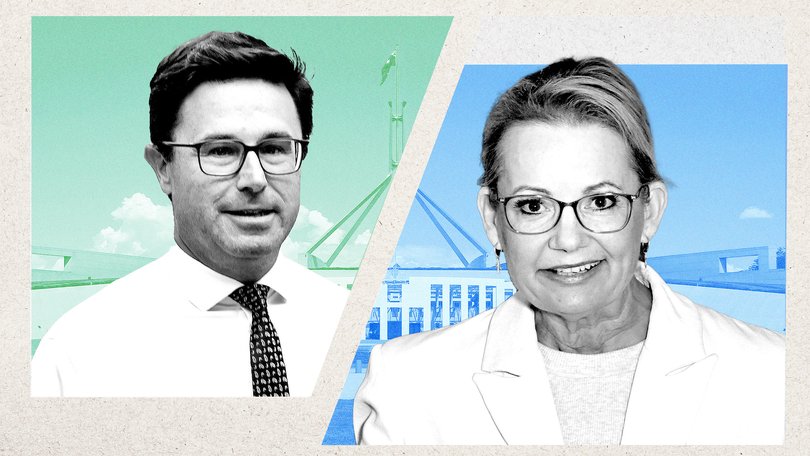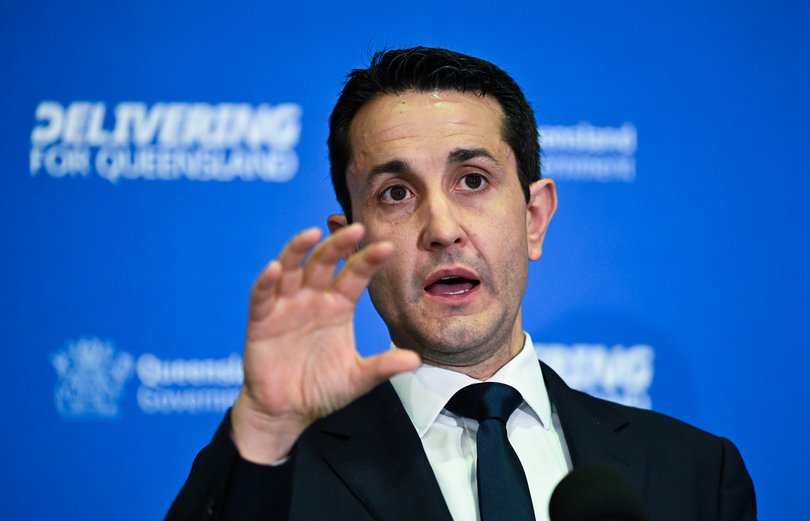Liberal strategist says Crisafulli shows why young voters hold key to Coalition recovery after poll disaster
Queensland Premier David Crisafulli has shown the way for the Coalition to recover from its ‘catastrophic failure’ at the last election, according to a respected strategist.

One of the Liberal party’s most respected strategists says the federal Liberal party should follow the example of Queensland LNP Premier David Crisafulli in appealing to young voters who have rewritten Australia’s electoral map, to recover from its “catastrophic failure” at the last election.
Tony Barry, former deputy state director for the Liberals in Victoria and now director at the apolitical research RedBridge Group, called on young conservatives to lead the charge.
But he warned them to stick to economics and not culture wars, citing the example of Queensland Premier David Crisafulli in matching Liberal policies with the everyday concerns and values of voters.
Sign up to The Nightly's newsletters.
Get the first look at the digital newspaper, curated daily stories and breaking headlines delivered to your inbox.
By continuing you agree to our Terms and Privacy Policy.Mr Barry made the remarks to the Young Liberal National Party’s gala dinner at The Star in Brisbane in a previously unreported speech obtained by The Nightly.
The speech was delivered before the Tasmanian Liberals stronger performance in the state election but ended in a hung result with the Liberals falling four seats shy of the 18 seats required to form a majority government.
Mr Crisafulli and NT Chief Minister Lia Finnochiaro are the only two governing Liberals in the country.
Mr Barry said the Liberals’ last two losses at the federal level showed that the party’s problems were greater than just the past two frontmen.
“Whilst election campaigns are the most complete examination of political leaders, the last federal election outcome should discredit the mythology that the last two results were just about the leaders,” Mr Barry said.
“Because like any catastrophic failure there’s seldom a singular cause.
“The magnitude of the losses we’ve recently seen at State and Federal levels points to a more complex explanation that means moving beyond the timeless pastime of searching for a scapegoat and a messiah.”

He said that the electoral roll, which had swelled in size to 18 million up from 13 million, was set to be dominated by millennials and Gen Z by the time of the next election.
He said Boomers, who comprised 55.4 per cent of Queensland voters in 2012, had fallen to just 37 per cent, while the millennial cohort had grown to around 36 per cent while Gen X remained steady at 26 per cent.
He said the victor would appeal to these voters but that this was especially difficult for the centre-right.
“The problem for conservative parties in Australia is that this demographic picture collides with our habit of internalising the orthodoxy that young people don’t vote Coalition, and the cost of acquisition of those votes is too high,” Mr Barry said.
“We’ve also accepted the doctrine that younger voters typically become more conservative as they move into their 30s.”
But he said that this was no longer the orthodoxy with younger Australians taking longer to buy homes and start families compared to their parents.
“Consequently, younger voters and their concerns have been written off in favour of more immediate electoral payoffs: housing and superannuation policies that have demonstrably favoured retirees; responses to climate change; a range of socially conservative positions; and horizontal and intergenerational inequity from a taxation system that collects too much revenue from income tax over other streams.”
He said that it was not just the change in how young voters behaved that was reorienting politics but also the migrant heritage of some three million voters who were mainly living in capital cities but choosing Labor.
“The values of many of this cohort align with traditional Liberal values - they see themselves as wealth accumulators and value opportunity and choice,” Mr Barry said.
“They should mostly be Liberal voters, but they are mostly not.
“Too often we see the country as we want it to be and not as it is.”
He said it was Queensland Premier David Crisafulli’s example that the party should be following.
He said in the last election, RedBridge polling showed that in the federal election just 19 per cent of voters aged between 18-34 voted for the Coalition compared to 40 per cent who opted for Labor.
But in the same period, the LNP’s primary vote in Queensland was nine points higher and seven points ahead for the 35-49 year-old voter group.
And more than half, 53 per cent, said they believed Premier Crisafulli had the right focus and priorities.
“The reasons underpinning this better performance by the Queensland LNP aren’t particularly complicated,” Mr Barry said.
“In our qualitative research, voters readily credit David Crisafulli and his team for their energy and focus on personally relevant issues.
“The Crisafulli Government is also demonstrating political and message discipline by keeping the conversation where they want it to be – economic responsibility and outcomes, better services and infrastructure and safer communities.
“They aren’t allowing themselves to be distracted by fringe issues or debates that have been long settled.”
He said by contrast, the federal Liberals were relying on a “fading historical perception” of being better economic managers.
Immediately after the election, the Opposition’s now finance spokesman but Peter Dutton ally, James Paterson said he disagreed with the Coalition’s policy to oppose Labor’s small tax cuts.
“If we are smart, we can own the economic narrative again.
“But that means re-engaging with the electorate on issues that are personally relevant and prosecuting the economic consequences of Labor.”
He said housing was the obvious issue the Liberals needs to focus on and present policy solution for.
“Housing attainability is the new political fault line in Australian politics and is creating economic insiders and outsiders,” he said.
“The risk for us as a political movement is when we effectively decide not to be in the conversation about the economy and economic reform we inevitably get drawn into culture war debates.
“Middle Australia is increasingly socially progressive but economically anxious – they don’t find the culture wars personally relevant either in terms of reflecting their concerns for the present or addressing their hopes and fears about the future.”
He said with less attention paid to politics than ever, it was essential the Liberals learned to pick the right fights.
“Whenever I hear a campaign talk about the need to energise their base with culture wars, it’s always a good indication that they’re not eating up any opposition territory, they can’t get any voters in the centre to support them, and they’re retreating back into their own bunker,” he said.
“We need to stop trying nothing and shift the conversation to where we are losing and not where we are winning.
“We aren’t going to be more competitive in the Millennial and Gen Z cohorts by involving more white blokes in their 50s in the political process.”

